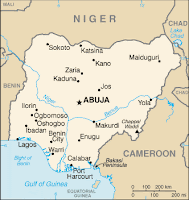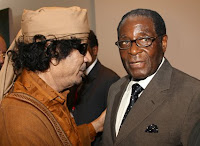It’s been an extra-ordinary year for Africa. The biggest losers were the North African leaders Ben Ali (Tunisia), Mubarak (Egypt) and Gaddafi (Libya). All three clung to power. Mubarak and Ben Ali had ruled some 30 years, Gaddafi even more than 40 years. Whereas the Tunisian and Egyptian leaders survived their ousting, the Libyan ‘Guide of the Nation’ was executed without a trial.
It is too early to tell who the winners are in these North African countries. In Tunisia democratic elections have since been held, won by the moderate Islamist party Ennahda, but political developments don’t stop after elections. In Egypt, with well over 80 million people the most populated country of the three, the new military rulers are reluctant to hand over power to democratically elected political leaders. Libya is a ‘powder keg’. It is uncertain what the outcome will be of the internal power struggle. The country is small but has vast oil and gaz reserves. Will the country remain ‘united’? For geo-political reasons (Egypt – playing a pivotal role in the Middle East conflict) and economic-strategic interests (Libya – oil and energy supply to the USA and Western Europe), developments in 2012 will be closely watched by the international community. But above all, the people in these countries deserve honest and democratically elected leadership.
For the biggest winners in 2011 we have to turn to West Africa. The biggest winners here are two Nigerians, Lamido Sanusi and Aliko Dangote, the Gambian Fatou Bensouda, two Liberians, Ellen Johnson Sirleaf and Leymah Gbowee, and the former Cape Verde president Pedro Pires.
Ex-President Pedro Pires won the prestigious Mo Ibrahim Prize, a USD 5 million
governance prize for exceptional African leadership. Mohamed Ibrahim is a Sudanese
mobile communications entrepreneur and billionaire, who created this Prize for democratically elected former African heads of state to reward democratic leadership and the peaceful transition of power. Liberian President Sirleaf, Africa’s first democratically
elected female President, and peace activist Gbowee were honored with this year’s Nobel Peace Prize, an achievement widely covered by news media all over the world.
The Gambian lawyer Fatou Bensouda will succeed Luis Moreno-Ocampo as the Chief Prosecutor of the International Criminal Court (ICC). She will thus be a key actor in the trial of former Ivory Coast President Laurent Gbagbo, one of the biggest losers in Africa in 2011. Gbagbo refused to hand over power to Alassane Ouattara after losing the presidential elections in 2010 causing a violent four-month conflict. He was handed over to the ICC in November of this year, indicted of crimes against humanity and is held responsible for murder, rape and other crimes allegedly committed by his backers as he clung to power.
The Governor of the Central Bank of Nigeria, Africa’s most populated country with 150 million people, Lamido Sanusi, was named by Forbes Africa Person of the Year 2011. Governor Sanusi has played a key role in masterminding and supervising extensive reforms in Nigeria’s banking sector. His compatriot Aliko Dangote is a succesful multi-billion businessman, who in 2011 overtook Mohammed Al Amoudi and Oprah Winfrey as the richest person in the world of African descent. The Dangote group owns subsidiaries in six African countries and employs over 10,000 people. Nigeria’s ambition is to belong to the group of 20 most important economies in the world in 2020 – nowadays it is Africa’s biggest economy after South Africa – and with people like Dangote and Sanusi I have little doubt that the country will succeed.
Another West African country deserves mentioning. Ghana is among the region’s leaders, being in 2011 the second-best performer in Sub-Saharan Africa on the Rule of Law Index of the Washington-based World Justice Project. Ghana was also the best performer among the group of 66 low-income countries world-wide, covered by the Index. The country also continued to do well economically, in 2011.
The Republic of South Africa was the best African performer on the Rule of Law Index. South Africa also remains Africa’s biggest economy, but has reasons to fear Nigeria as a serious competitor.
Election Year 2011
In the beginning of this year I published a series of posts on ‘Bullet or ballot propelled changes in Africa’ focusing the political future of African countries and particularly the multi-party presidential elections that were to take place in 2011. See my posts dated March 1 and March 8. Out of 53 African countries – including the Republic of South Sudan which joined the community of African nations in July of this year – 18 countries planned to have presidential elections in 2011 (with 9 countries also holding legislative elections), an unprecedented high number. What was the outcome? Who were the winners? Who were the losers?
Well, of the 18 planned presidential elections two have been postponed (in Madagascar and Zimbabwe), one was cancelled because of a people’s revolution (Egypt). In the remaining 15 countries , 11 incumbent presidents saw their mandates renewed. As I stated before, African presidents don’t like to give up power. Only in four countries the oppositional candidate won the elections: the West-African island-nations of Cape Verde and Sao Tomé & Principe, Sahelcountry Niger in West Africa, and Zambia in Southern Africa.
Central Africa
In Central Africa four incumbent presidents managed to stay in power: Paul Biya, nick-named ‘The Gaddafi of Black Africa’ in Cameroon (ruling the country with an iron fist since 1982) ; Chad’s Idriss Deby (who chased dictator Hissein Habré in 1990 but has since remained in power), former army chief of staff François Bozizé in the Central African Republic (president after winning an internal power struggle in 2003), and Joseph Kabila who in 2001 succeeded his assassinated father.
Kabila was recently inaugurated after disputed presidential elections which the main oppositional candidate Thsisekedi claims to have won. Only one president attended Kabila’s inauguration, Zimbabwean President Robert Mugabe, and the Obama Administration has raised doubts over the legitimacy of his re-election. The situation in this vast country, big as Western Europe, risks to deteriorate and an Ivory Coast like scenario is feared.
East Africa
The three presidential elections were all won by the incumbent presidents (between brackets the year of coming to power): Museveni in Uganda (1986), Ismael Omar Guelleh in Djibouti (who succeeded his uncle Hassan Gouled Aptidon in 1999) and James Michel of the Seychelles, an Indian Ocean archipelago (2004).
Southern Africa
As already mentioned, elections were postponed in Zimbabwe and Madagascar, and won by the opposition in Zambia. Zimbabwe’s Robert Mugabe is one of the longest ruling African leaders: since the country’s independence in 1980.
West Africa
In Nigeria, ‘southerner’ Goodluck Jonathan was elected in his own right, after assuming the Presidency following the death of the ‘northerner’ Yar’Adua in 2010. The political tension between the north and the south of the country remains one of the most dangerous threats to Nigeria’s political stability and hence its economic aspirations. In neighbouring Benin, President Yayi Boni (2006) was re-elected whereas also Madame President Ellen Johnson Sirleaf obtained (2006) a second mandate. Finally, in the tiny republic of The Gambia dictator Jammeh (1994) won elections which hardly deserve the name.
Is there a conclusion that can be drawn from the foregoing?
Despite the demonstrated tendency of African presidents to remain at all costs in the presidential palace, I am optimistic that 2012 will bring (more) positive developments. Overall, African countries are economically not performing badly, despite the global economic crisis. Mobile telephone, internet and the use of social media have become major instruments for the dissemination of information. Events in North Africa have demonstrated that the people’s will to remove their power-thirsty and corrupt presidents can prevail. Strong people in West Africa have gained world-wide admiration and recognition. Of course, people like the Sudanese president al-Bashir have managed to avoid arrest, with the protection of certain fellow-presidents, but the day will certainly come that he also will face justice before the ICC in The Hague. May Gaddafi’s summarily execution and Gbagbo’s fate in The Hague serve as a deterrent for the dictators and human rights violators that Africa unfortunately still counts.
I wish you all a prosperous, happy and healthy 2012!
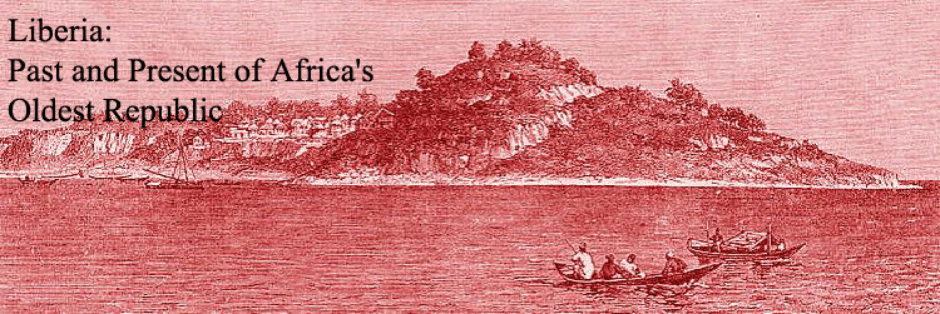
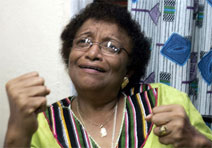
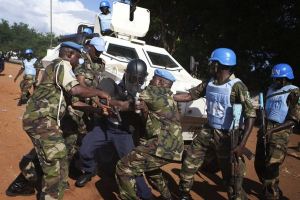
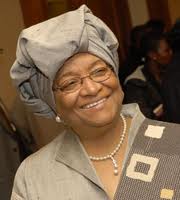

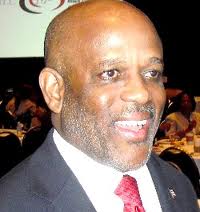
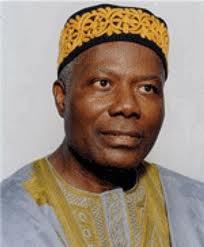
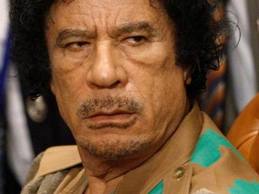 Gaddafi’s political end is near
Gaddafi’s political end is near 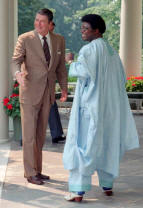
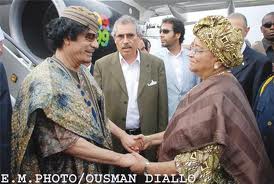
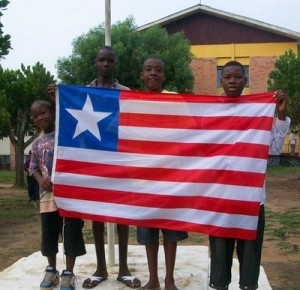
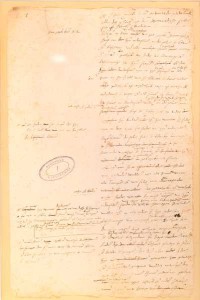

 A bloody coup d’état in 1980 changed this situation.
A bloody coup d’état in 1980 changed this situation.  Prince Johnson, one of the warlords in Liberia’s civil war, brutally tortured Doe to death in 1990.
Prince Johnson, one of the warlords in Liberia’s civil war, brutally tortured Doe to death in 1990. 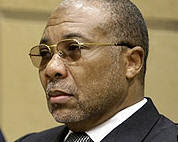 Liberia started the 21st century with an elected president, former warlord Charles Taylor, who was forced to resign in 2003, subsequently went into exile, but was later handed over to the
Liberia started the 21st century with an elected president, former warlord Charles Taylor, who was forced to resign in 2003, subsequently went into exile, but was later handed over to the 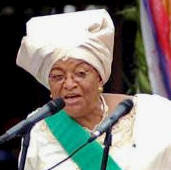 Ellen Johnson Sirleaf’s skills, experience and international connections have resulted in an impressive number of important achievements, in particular
Ellen Johnson Sirleaf’s skills, experience and international connections have resulted in an impressive number of important achievements, in particular  April 12 is a date to remember. Liberians immediately think of April 12 1980: the day
April 12 is a date to remember. Liberians immediately think of April 12 1980: the day  However, after the fighting started,
However, after the fighting started,  First, and let’s look at the Ivorian scene from a positive and optimistic angle,
First, and let’s look at the Ivorian scene from a positive and optimistic angle,  Another civil war will ravage the region – after the wars in
Another civil war will ravage the region – after the wars in 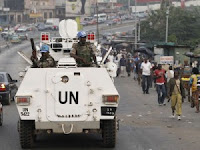 Just as
Just as  Once he is elected in his own right,
Once he is elected in his own right, 